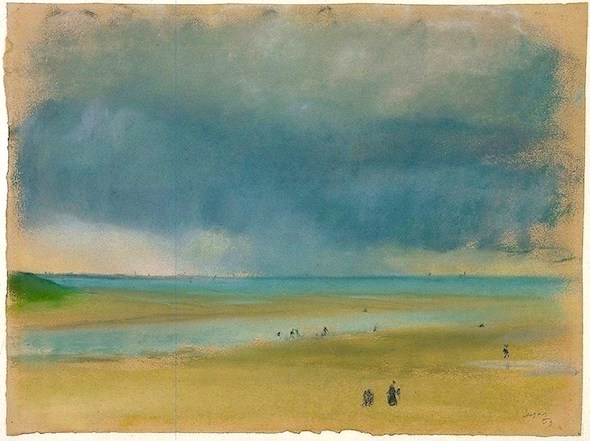
EdgarDegas A la mer 1863
Something hit me this week. The maps which came out on Monday and detailed the outcome of the French elections, were telling a story, and a familiar one by now. A story of deep division. There are a number of such maps now depicting the Brexit vote in the UK, the US presidential elections, and its French counterpart.
In all three cases they leave me wondering something along the lines of: ‘Are you guys sure you want to remain in the same country with each other?’ Because to me that is not all that obvious, and I think it’ll get less so as time passes. For instance in the case of France, the ‘ideological’ differences between Macron and Le Pen are substantial to say the least, they’re worlds apart.
And if you’re worlds apart, why live in the same country? Here’s that French map:
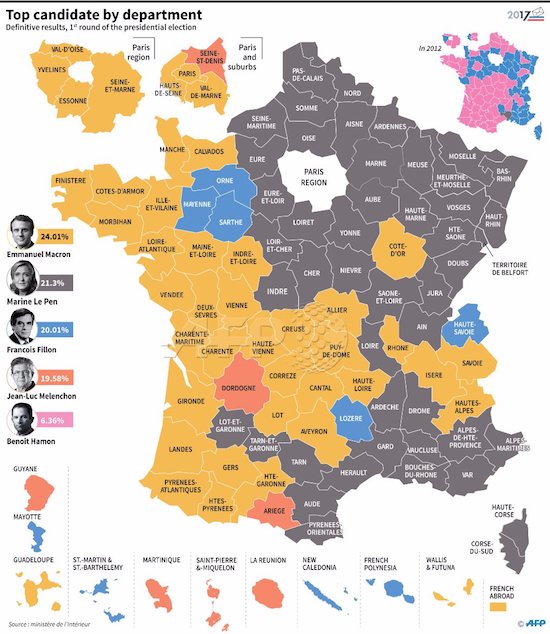
As you see, the country is sharply divided between west (Macron) and east (Le Pen). So much so that you wonder what these people still have in common, other than their language. There’s no doubt it’s also a dividing line between the richer part of the country, and the poorer.
Thing is, that same dividing line is visible in a similar map of the November 8, 2016 US election results, in a slightly different way.
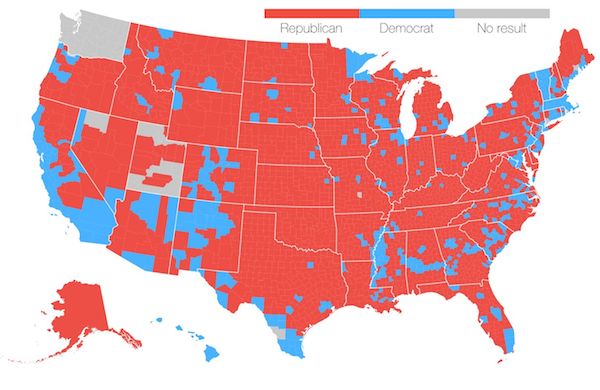
In the US it’s not east versus west, it’s coast versus interior (flyover land). But the difference is equally clear and sharp. In fact, probably what we’re looking at is that France has only one coastline, while the US has two, and in both countries people living close to the ocean are on average richer than those who live more inland.
And in both cases there is no doubt that wealth is a deciding factor in dividing the nations to the extent that they are. We see that in an ‘urban versus rural area’ comparison as well. Cities like New York, LA and Paris are strongholds for the incumbent and establishment, the parties that represent the rich.
There can be no doubt that we’ll see more of that going forward. It won’t be there in smaller countries, Holland for instance is not nearly large enough for such dynamics. But Italy very well might. It’s always had a strong north-south-divide, and its present crisis has undoubtedly deepened that chasm.
Looking at things that way, it’s also glaringly obvious that Macron is Obama (and is Renzi is Cameron etc.). A well-trained good looking mediagenic puppet with a gift of teleprompter gab, fabricated and cultivated by the ruling financial and industrial world to do their bidding. Macron, to me, looks the most artificial of the crop so far, the Obama, Rutte, Cameron, Renzi crop. There will be more, and they will get more artificial. Edward Bernays is just getting started.
Of course there is also a strong move away from established parties. It is more pronounced in France -where they were eradicated at least in the presidential elections- than in the US or UK, but that may be more of a superficial thing. Trump and Bernie Sanders are simply America’s version of France’s ‘ultra’ right wing Le Pen and ‘ultra’ left wing Melenchon. And Trump is running into problems with the remnants of the established parties as much as Macron will if he’s elected president.
Anglo countries seem to take longer diversifying away from tradition than others, but they too will get there. The various deteriorating economies will make sure of that.
A third map is of the UK Brexit vote. Once again, a sharp division, and once again with a ‘character’ of its own. If you ignore Scotland for a moment, what you see is blue=poor and yellow=rich. Broad strokes, I know, but I’ve been doing that with the first two maps too. There are only a few pockets of yellow=rich=remain. But yeah, fewer people live there. Same thing as in the US and France.
That the whole Brexit thing should now be negotiated by the Tories is a cynical irony the country owes to its adherence to tradition. That is how that backfires, too little flexibility. How the UK will solve its many ignored issues is anyone’s guess. Will Scotland leave the no-longer-very United Kingdom? Will voters wake up in time to not present the Tories with a free hand to make the rich-poor divide even worse?
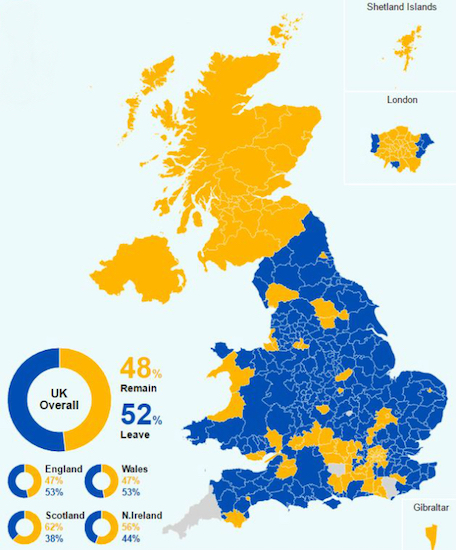
There’s one more, and more detailed, map of France, which shows even better to what extent ‘Le Pen country’ is eerily similar to America’s flyover land. It’s almost poetic, a poem about how countries fall apart, about centers that cannot hold. It also makes me think of a locust invasion, by the way.
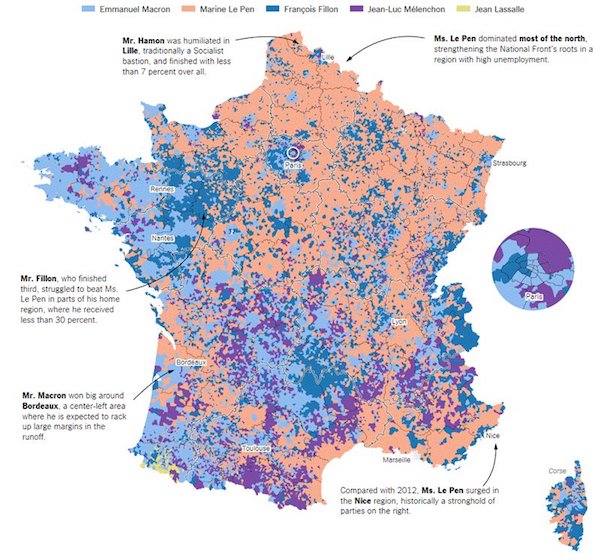
Every French and European body and their pet hamster is presently telling voters in France to please please not vote for Le Pen, in a move that resembles similar calls against Trump and Brexit. And who knows, it might work this time around. The anti-Le Pen frenzy is even stronger than the others, and it has Marine’s crazy father to use as a warning sign.
But as these maps show, it’s not about Le Pen, or Trump, or Nigel Farage. It’s about people being left behind in ever larger numbers, susceptible to voices other than the ones they’ve known for a long time and who never listened to them. And nothing is being done to address these people’s claims; on the contrary, things are only getting worse for them.
I saw a headline today that said ECB president Mario Draghi’s “Stimulus Could Blunt Populism as Unemployment Declines”. There’s only one possible reaction to that: what happens when he stops his stimulus?
The growing divides that all these maps bear witness to will keep growing, unless someone decides that neo-liberalism has gone too far. But the only person who could make such a decision would have to be one who neo-liberalism itself has made rich and powerful. So don’t count on that happening.
Count instead on more Trumps and Le Pens and Sanders’s. And also on more Obama’s and Macrons for the rich to deploy to protect their power and hold on to their riches. Increasingly it would seem they have to limit democracy -even further- to remain in power. So count on that happening too.
But don’t count on all these countries surviving as sovereign nations. The chasms are widening too fast and too much.








Home › Forums › The Great Divides